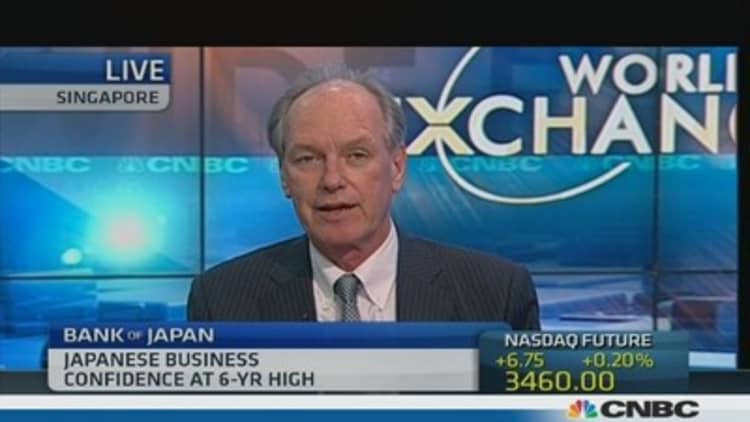
A year on from the start of the economic overhaul introduced by Shinzo Abe, Japan's prime minister, "Abenomics" has been "close to a bull's eye" with small and medium-sized enterprises beginning to reap the rewards, according to analysts.
Thomas Byrne, regional credit officer for Asia and the Middle East at Moody's Sovereign Risk Group, told CNBC Abe's policies had so far been a success regarding the weakening of the yen and the latest data on business sentiment.
Business confidence in the country improved over the three months to December to reach its highest level in six years, according to the Bank of Japan's "Tankan"survey. Smaller manufacturers' sentiment also hit a six-year high and the small non-manufacturers' index turned positive, indicating that optimists outnumbered pessimists for the first time since 1992.
(Read more: Business sentiment in Japan hits a 6-year high)
Abe became prime minister in December 2012 and announced a series of policies – such as quantitative easing from the Bank of Japan, the devaluation of the yen and infrastructure spending – aimed at rejuvenating a stagnant economy with an ageing workforce.
Discussing today's business survey results, Byrne told CNBC, "Another noticeable development ...was that the small and medium enterprises have turned a corner and they've moved into positive territory. The large enterprises have been in positive territory for a while, so Abenomics is having a deep effect.
(Read more: Will Japan's elderly get burned by 'Abenomics'?)
"I think that's particularlyimportant because most of the employment, and therefore the wage increases, are generated by smaller enterprises not by the large enterprises. And for Abenomics to really work, the corporate profits have to filter down into wages as well."
Francois Savary, the chief investment officer at Reyl & Cie, concurred with Byrne's analysis.
"We remain very positive because we believe the yen is going to depreciate further in the course of 2014. We believe that Abenomics is working, that the first steps are going exactly the way we expect them to go," he told CNBC.
(Read more: The verdict on Abenomics, one year on)
Byrne did stress that a consumption tax to be introduced next year will hit investment, and that to counter this there needed to be a decent strategy from Abe. "The growth strategy," he said, "really hasn't been implemented yet, so we don't know whether that will hit the target or not, but that will be key for the outlook, not just for next year but for the years ahead."

